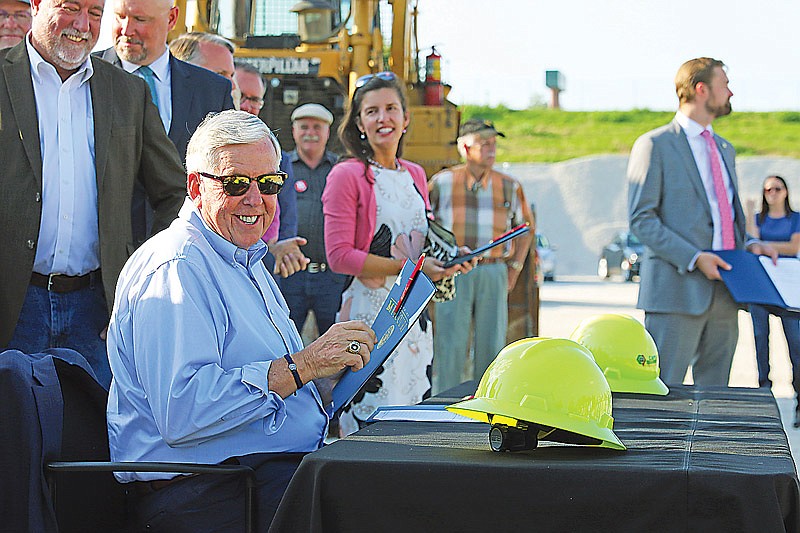The Missouri Department of Transportation has secured critical funding for bridges and roads as an increase in the state's motor fuel tax was signed into law Tuesday.
SB 262 raises the state's tax on motor fuel by 2.5 cents per gallon starting Oct. 1. The tax then increases by 2.5 cents per gallon July 1 every year until 2025 for a total of 12.5 cents per gallon.
The new law allows Missouri drivers to request an exemption and refund of the new fuel tax, provided they submit written verification, like receipts, of the amount of fuel tax paid for each vehicle in the given fiscal year. Claims are made under the penalty of perjury and must be filed by Sept. 30 of the following fiscal year.
Gov. Mike Parson ceremonially signed the legislation into law Tuesday in four areas: Kansas City, Hazelwood, Cape Girardeau and Jefferson City.
"With nearly $1 billion in unfunded transportation needs each year, we can no longer wait for another day or another generation. We must change course and address these problems head-on," Parson said in a news release. "SB 262 provides vital revenue that will help us fund essential road and bridge projects all across the state. Quality roads and bridges increase the efficiency and safety of our roadways, invite travelers and business investment and save Missourians money."
Parson said the bill has the potential to raise more than $450 million in transportation funding while in full effect - roughly $330 million would go to MoDOT's State Road Fund each year and about $125 million would go directly to cities and counties for local transportation projects.
MoDOT Director Patrick McKenna said the gas tax was the department's biggest budgetary accomplishment this legislative session, even though it isn't affecting the fiscal year 2022 budget.
McKenna said Missouri's transportation system has been underfunded for decades, which makes it difficult to address new projects while maintaining the system.
"Our costs have increased over the past 25 years beyond which the rate of taxation hasn't," McKenna said. "It's really a user fee, not a standard tax, but a user fee because the more you drive and the more fuel you consume, the more you pay."
Missouri's transportation system is the seventh largest in the country, but the state ranks 45th in transportation revenue per mile.
The Statewide Transportation Improvement Program, MoDOT's five year construction plan approved July 1, has a focus on system maintenance and repairs across the state.
Currently, 90 percent of the state's roads are in good condition, McKenna said, but there is a significant deficit in funding for bridges. Parson's Focus on Bridges program has provided some additional funding.
Missouri's fuel tax was last raised in 1992. The tax was raised by a total of 6 cents in three increments, each two years apart. McKenna said there have been some additional funding measures put in place since then, like the vehicle sales tax in 2004, but the base revenue for the department hasn't been changed in 25 years.
Improving fuel economy in vehicles coupled with rising construction costs have been a challenge for the department.
"Our purchasing power of that 17-cent fuel tax that dates back to 1996, the last time it was adjusted, is under 50 percent of what we could do," McKenna said.
That means the department can buy half of what it could 25 years ago. McKenna said the department cannot fulfill its growing list of transportation needs because of a lack of resources.
"This is an overdue proposal," McKenna said. "We're really pleased that the policymakers recognize the urgent need for upgrading our transportation infrastructure and keeping what has already been built over the last 100 years in a state of good repair so that it's safe and efficient for the citizens who count on it and use it everyday."
The legislation was sponsored by Senate President Pro Tem Dave Schatz, R-Sullivan.
Schatz said he had been working on funding roads and bridges since first elected to the General Assembly in 2010.
"It gave the people that want to invest in transportation the opportunity to do that and those that did not want to have the opportunity to receive a refund," Schatz said. "I don't think it could have got any better. And for us to get this across the finish line, that was a critical piece to get that done."
Rep. Becky Ruth, R-Festus, is chairman of the House Transportation Committee and carried the legislation in the House.
Ruth said she met with transportation officials from other states and around the country to draw inspiration for Missouri's gas tax plan that incorporates a refund, which is similar to legislation recently enacted in South Carolina.
"We fine-tuned the language, we had attorneys look at this, give us legal opinions to make sure we were doing everything that was constitutionally correct in order for the Legislature to be able to do this," Ruth said.
McKenna said he doesn't know what the impact of the refund option will be, but the department will be monitoring it over the next few years.
Parson said the investment in infrastructure will be beneficial for the state's economy as businesses seek to locate to states investing in infrastructure.
"You're going to create numerous jobs, not for just a year, not for two years, but for decades with what we're doing here today before this is fully implemented in the state," Parson said. "That is what's important for the future of our state."
SB 262 also creates an Electric Vehicle Task Force within the Department of Revenue to study and make recommendations on electric vehicles and transportation funding, increases the maximum age of vehicles required to have odometer readings recorded from 10 to 20 years, increases alternative-fuel decal fees by 20 percent for five years, and prevents those with felony human trafficking charges from driving commercial vehicles.

